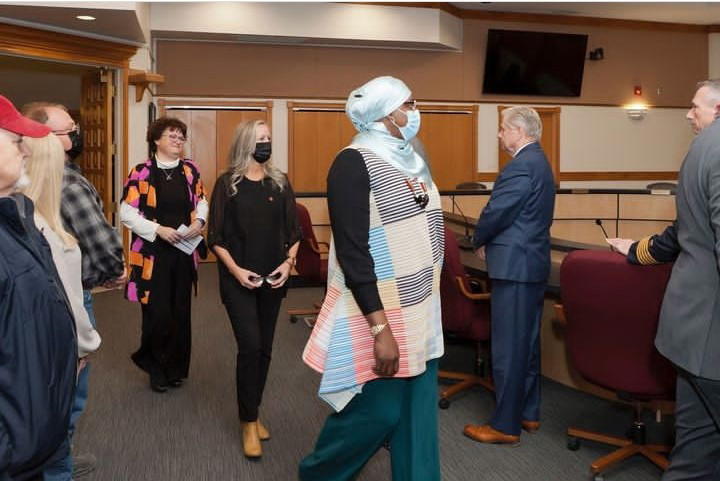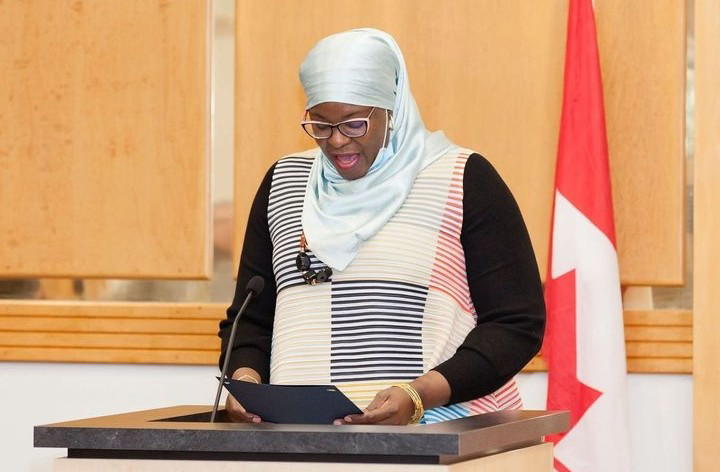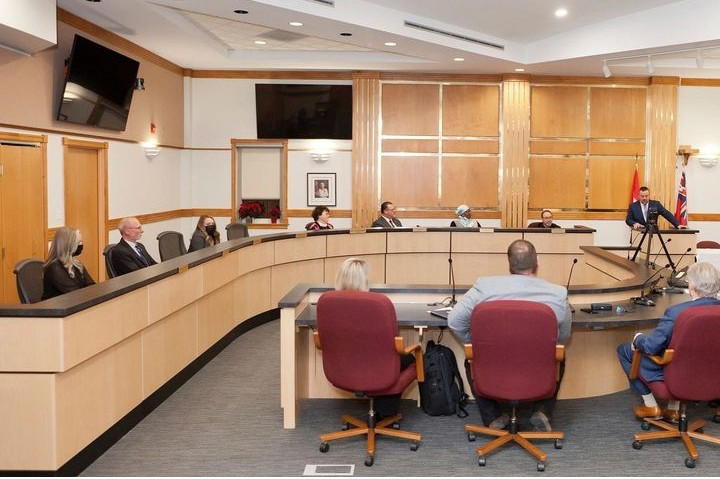“Nigerian government should please give the chance for rule of law to prevail, let’s hold it sacred. Let’s also make room for the younger generations so that we can have more aligned vision for our future.”
Nigerian-born Canadian councillor, Mrs Khadijah Haliru, in an exclusive interview with Biodun Busari of VANGUARD on Friday, advised the Nigerian political class to give opportunities to youths to govern Nigeria.
Mrs Haliru, a graduate of Ahmadu Bello University, Zaria, Kaduna State, who emerged at the polls as a councillor of Ingersoll town, Oxford County, Ontario, Canada, last month also spoke about the brain drain in the country and how the Nigerian government can take advantage of it.
Below are excerpts:
Briefly tell us a few things about your education and work in Nigeria and now
My name is Khadijah Haliru and I’m a mother of three. I work as a supply chain professional in aircraft manufacturing. I have a degree in Public Administration, and I have always been in love with government and administration. In Nigeria, my first job after NYSC, was working in Mushin local government area of Lagos state as a personnel administrator.

From there, I got my first job with MTN in 2000. I worked there until my family left the country for my husband’s MBA in 2003, and then we moved to Canada in 2006. I pursued a diploma in fitness and nutrition in the US and a supply chain management Diploma in Canada leading me to launch K business group Inc as our family business, manufacturing Canada’s first bottled Nigerian stew (HANAK Stew) and (K body blends) as our core brands.
How long have you been in Canada? Will you like to tell us about the scheme you travelled with?
We have been in Canada for 16 years now. We immigrated using the Skilled Worker Program now called express entry.

I’m sure you know about Japa (where Nigerian youths including doctors, lecturers etc are travelling en masse to developed countries in search of greener pastures, what’s your take on it?
The brain drain that is happening right now in Nigeria is a recognition of our talents and resourcefulness, and I think though heartbreaking for Nigeria, it can be an opportunity for the country to take advantage of the experience a whole generation can gain for the future.
In the 60s and 70s, a lot of people left the country to go to school abroad on scholarships. Most of them returned to offer Nigeria what we as the next generation of the 70s and 80s kids benefitted from. I think at this point, most of those kids are the ones now looking for better opportunities outside the country.
Fingers crossed we always come back home. Unfortunately, the situation is really difficult for the country people just want a life of ease where their hard work can be quantified. People want to be valued and earn a living wage. Nigeria needs to design a policy that addresses this now! My one easy solution would be to propose an hourly pay system. We have taken advantage of the salary system for too long. Not everyone needs and can survive on it and those who deserve more usually don’t get their worth, while those who don’t work enough get to reward bad behaviour shortchanging the system as a whole.
How can you compare the Nigerian system (infrastructure, leadership, politics etc) to Canada? What should the Nigerian government learn?
I tell you right now when I graduated from university, I went to Ahmadu Bello University, Zaria, Kaduna state and I graduated in Public Administration, but the Nigerian experience was about tribalism, it was open nepotism, it was about bribery, and who knows who. It’s really just kept a lot of people out of the door even if they were really patriotic and wanted to give back. These people are becoming wasted talent and I think that’s one of the biggest hurdles for anyone and that’s why for many like me, I also ventured into entrepreneurship until MTN came along with many fresh graduates who were losing hope.
When you get to a place like North America, the immigration process is simple and when you are granted a residency, you get settled and you find your way. Even if you don’t find work immediately, you are supported to find work or start a business as an entrepreneur. The Nigerian government needs to go back to basics. Find collaborations that open doors for skill transfer to Nigerians in Nigeria and bring or support local companies that create jobs.

The difference mainly between how the West govern compared to Nigeria is simply honesty and integrity that is enforced by our laws. The rule of law stands despite the fact that many can still be dishonest, but there are consequences. Where people can get away with stealing and bribery, we cannot have accelerated progress.
What’s your advice for the Nigerian government now that you have seen differently in Diaspora?
My advice for the Nigerian government should please give the chance for rule of law to prevail, let’s hold it sacred. Let’s also make room for the younger generations so that we can have a more aligned vision for our future. No matter how experienced you are, no matter how old you are, the more fatherly you are, there is always a blind spot. Women’s leadership styles nurture we need more women to help nature for progress.

Let’s seek more women in office. Many may have done a lot in their past, but sometimes if you give a young person the chance then you will see a thoroughly different perspective. This allows for better decision-making when we sit at the table and are from different backgrounds, different age groups and different experiences. Let’s give everyone a chance to be eligible to run for office because no matter how much money you have, it’s about how many people you impact not your wealth.


